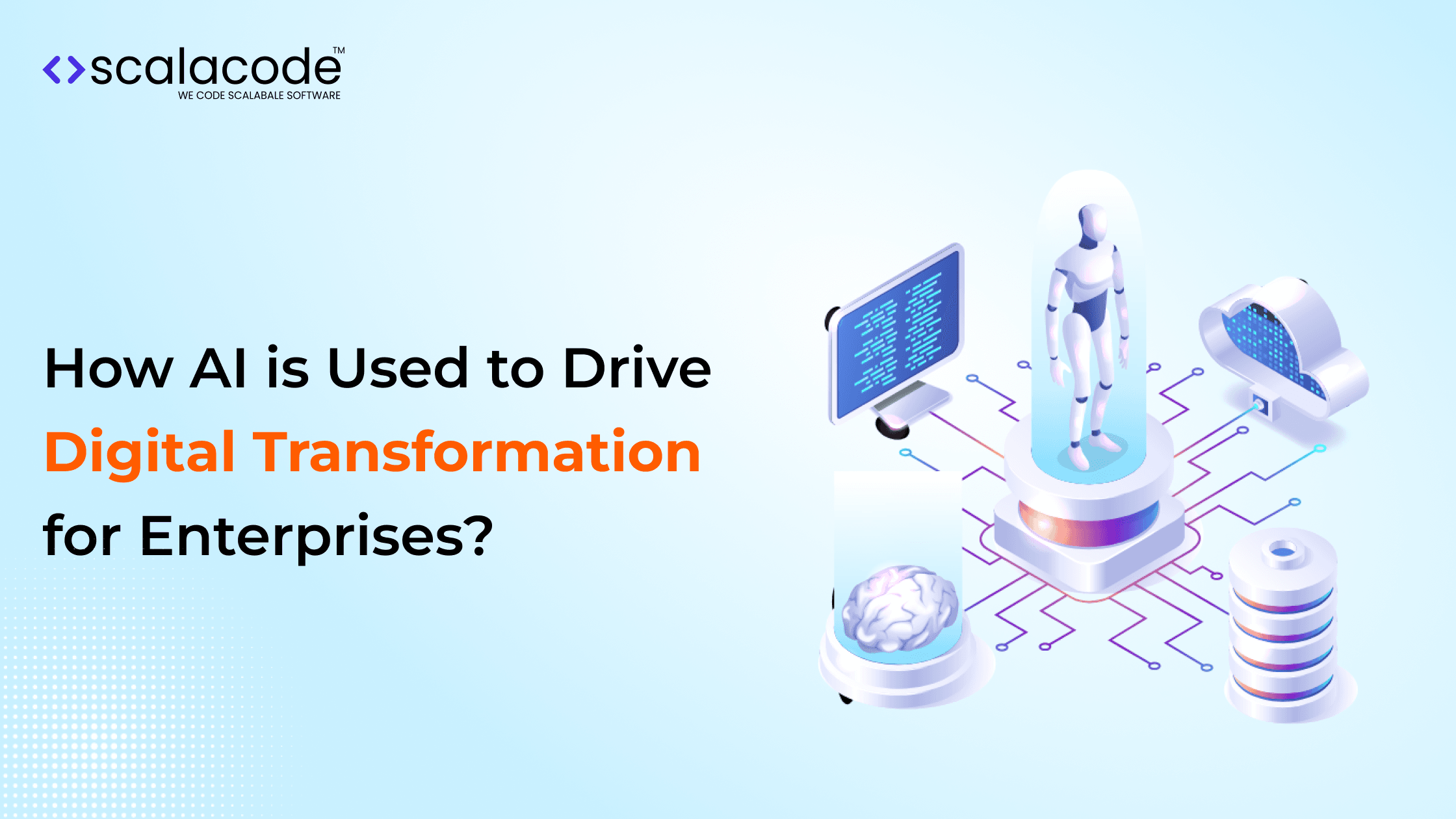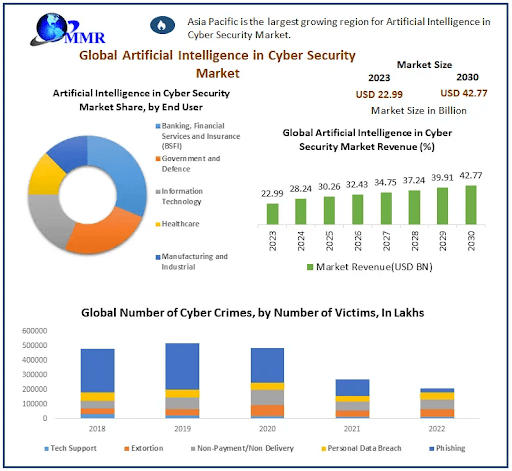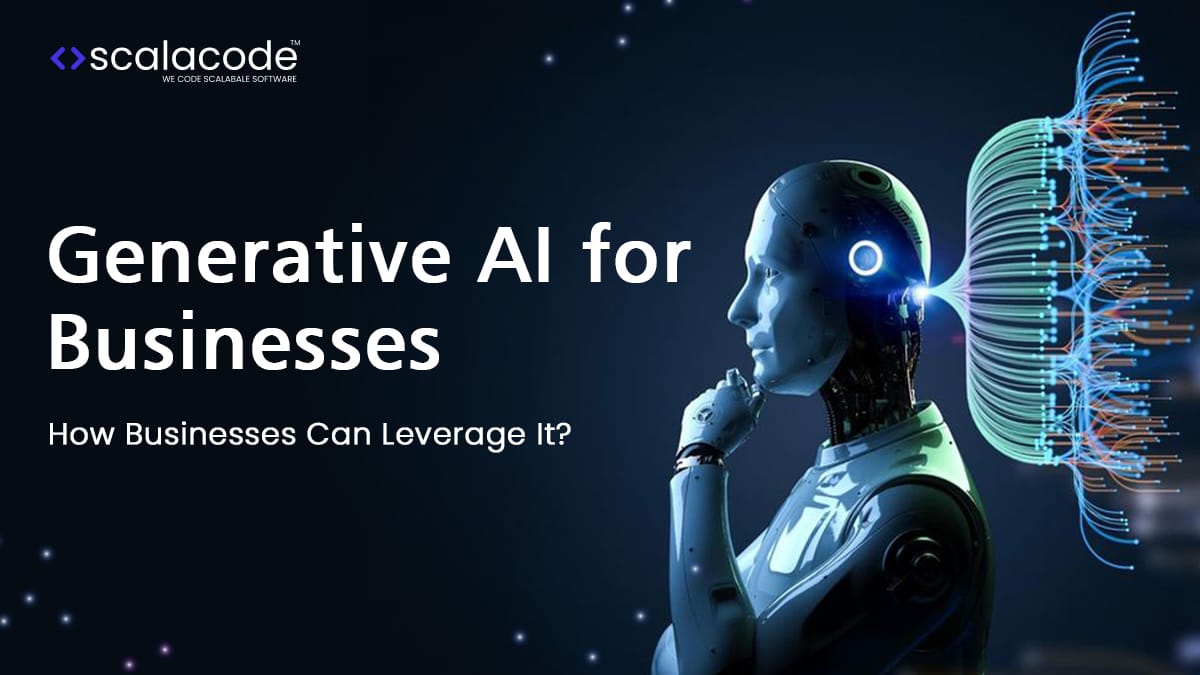As the saying goes, ‘The only constant in business is change.’
Well, it’s never been more true than in today’s fast-paced digital world. And guess what’s at the heart of this ever-evolving landscape? Artificial Intelligence (AI)!
Yes, that is true, AI isn’t just about robots taking over the world; it’s also playing a crucial role in driving digital transformation for enterprises across the globe.
Each moment we see technologies advancing at an unimaginable rate. Herein, companies who are proactively adopting these technological advancements see rapid growth in their business.
Besides, here is a report by McKinsey & Company that reveals companies implementing digital tools have seen almost 2X the rate of profitability compared to those who have not.
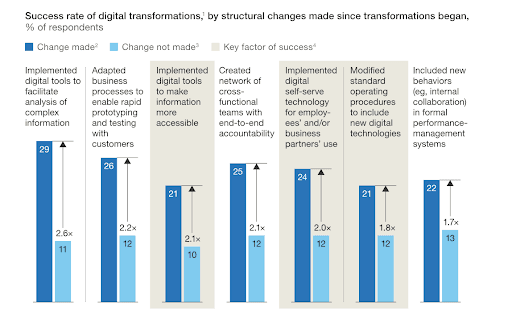
Moreover, the role of AI in digital transformation can’t be overstated. After all, who would have thought, just a few decades ago, that machines could learn from their experiences, much like humans?
But here we are, witnessing this reality where a digital transformation company in India is using AI. Artificial intelligence is reshaping the way enterprises operate, innovate, and serve their customers.
Google CEO Sundar Pichai says artificial intelligence is going to have a bigger impact on the world than some of the most ubiquitous innovations in history.
In fact, IDC research predicts that global AI spending will reach $300 billion in 2026.
So, what exactly is the role of AI in business transformations is taking place? Let’s understand this.
Firstly, let’s know the hefty term Digital Transformation.
What is a Digital Transformation?
Digital transformation is nothing but can be referred as to the integration of digital technology into all areas of a business. Fundamentally, you are using technology to change how you operate and deliver value to customers.
It’s a cultural change that requires organizations to continually experiment, challenge the status quo, and dodge failure.
And this is where AI and other technologies make this process more efficient So, let’s know the influences of AI on digital transformation.
What is AI in Digital Transformation?
If we look closer, we can see that AI in digital transformation represents a set of technologies that allow machines to sense, comprehend, act, and learn. Ultimately, this helps to perform administrative and cognitive tasks that were once considered the exclusive domain of humans.
This is incredibly significant, isn’t it? But there is a difference between leveraging AI and automation.
Automation vs. Artificial Intelligence
| Aspect | Automation | Artificial Intelligence |
| Scope | Pre-existing, well-defined processes | Complex or undefined challenges |
| Decision Making | User dictates processes within set parameters | Learns from data, adapts, and suggests actions |
| Flexibility | Limited adaptability | Dynamic response to new information or scenarios |
| Learning Ability | Follows predetermined rules | Analyzes data, self-corrects, and learns from experience |
| Application | Streamlines existing processes | Tackles novel or intricate problems |
It’s important to understand the differences between automation and AI because they show how AI can help businesses do more than just work more efficiently.
Let’s explore further, the AI in digital transformation.
The Role of AI In Digital Transformation
For businesses, the adoption of AI is no longer a luxury but a necessity to stay ahead in the game. Let’s delve deeper into the roles AI plays in various business domains, shall we?
1. Customer Service
Remember the last time you interacted with a customer service chatbot? That’s AI at work! By handling queries 24/7, AI-driven chatbots have revolutionized customer service. Not only do they ensure immediate response times, but they also continuously learn from interactions to provide more personalized assistance.
That is a win-win for both companies and customers.
For example, Consumer packaged goods (CPG) and retail leaders outperform their peers in the same sector by three times.
Meanwhile, companies in energy, materials, and agriculture perform two times better than others in their industry.
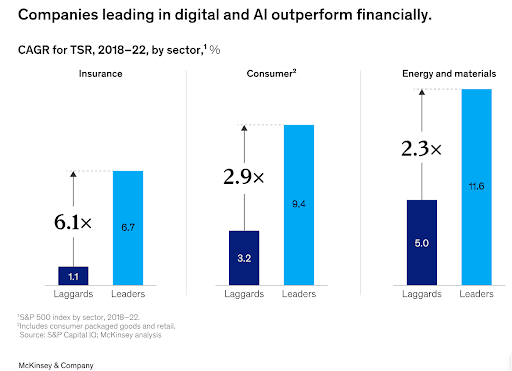
2. IT and Security
In the IT domain, AI is like the watchful guardian. With cybersecurity threats evolving rapidly, traditional security measures no longer suffice.
AI, with its ability to predict and neutralize threats based on data patterns, provides a dynamic defense mechanism.
Moreover, a software development company in India uses AI to automate routine IT tasks, allowing the human workforce to focus on more strategic issues. Surely, the importance of AI in this domain cannot be overstated.
Furthermore, AI-powered security technologies leverage machine learning to scan systems for unusual behavior.
Innovations such as biometric authentication, double-factor authentication, and advanced password management are instrumental in safeguarding business.
According to Capgemini Research Institute, 69% of organizations believe that AI helps make their computer systems stronger against cyber threats.
As more companies use AI for security, it’s important to have rules that ensure AI is used responsibly and helps make systems safer.
Moreover, the Artificial Intelligence in Cyber Security Market was worth USD 22.99 billion in 2023. It’s projected to grow at a rate of 22.8% from 2024 to 2030, reaching almost USD 42.77 billion by 2030.
3. Sales
Ever wondered how companies seem to know exactly what you need? AI’s predictive analytics comes into play here. Leavering AI makes the analyzing customer data to predict future buying behaviors and preferences.
AI-guided sales processes help by pointing out which leads are more likely to convert based on customer and account historical data.
Companies that utilize AI-enhanced technologies experience significant improvements in sales performance compared to those that do not.
These businesses have an 84% higher chance of meeting quotas. Besides, a 67% increase in closed deals, and a 50% greater success rate in acquiring new prospects.
Additionally:
- AI predicts potential prospects.
- It ensures that ads reach the right people at the right time.
- Helps with cross-selling or upselling efforts
- Assists in pricing strategies
- Monitors phone calls for agent training purposes
Moreover, WBS research reveals that its software can produce a net gain in productivity of 64%, helping automate entire sale funnels from start to finish!
4. Business Operations
AI can predict maintenance requirements for machinery that is prone to frequent breakdowns, thereby saving companies significant amounts of time and money. Additionally, AI algorithms are being utilized to optimize supply chains, making them more efficient and responsive to market changes.
For instance, AI can forecast demand for products with surprising accuracy, enabling companies to adjust their production schedules and inventory levels accordingly. Isn’t that remarkable?
5. Customer Experience
Furthermore, AI plays a pivotal role in enhancing the customer experience. Today, AI-powered chatbots provide 24/7 customer support, answering queries and solving problems in real-time. These chatbots are continually learning from interactions with customers, thus improving their ability to handle complex issues.
Moreover, AI tools analyze vast amounts of data to personalize the customer experience. By understanding customer preferences and behaviors, companies can tailor their offerings, ensuring a more engaging and satisfying interaction.
Hence, isn’t it evident that AI is transforming the way businesses interact with their customers?
6. Data Analysis and Decision-Making
But wait, there’s more. AI is also revolutionizing the field of data analysis and decision-making. Through advanced algorithms and machine learning, AI can sift through massive datasets, uncovering insights that would be impossible for humans to detect.
This capability allows businesses to make informed decisions quickly, responding adeptly to emerging trends and competitive pressures. For example, financial institutions use AI to detect fraudulent activities by spotting anomalies in transaction data.
Consequently, the use of AI in data analysis not only enhances operational efficiency but also improves security and compliance.
7. Innovation and Competitive Edge
AI is a key driver of innovation, giving companies a competitive edge in the marketplace. By leveraging AI, businesses can develop new products and services or improve existing ones in ways that were previously unimaginable.
AI algorithms can simulate countless scenarios, predicting potential outcomes with a high degree of accuracy. This predictive power enables companies to experiment and innovate with less risk, accelerating the pace of development and bringing breakthroughs to market faster.
Therefore, it is clear how AI is not just changing the game but also setting new rules in the world of business.
Top 5 AI-Powering Tech Trends For Digital Transformation In 2024
1. Artificial intelligence of things (AIoT)
The Artificial Intelligence of Things (AIoT) Market Size surpassed USD 9 billion in 2022 and is projected to grow at a CAGR of 20% from 2023 to 2032. This growth is fueled by the increased adoption of AI and IoT technologies across various industries.
AIoT combines the strengths of artificial intelligence and the Internet of Things to offer advanced data analysis, improved operational efficiency, and better decision-making capabilities.
Industries like healthcare, manufacturing, retail, and transportation are increasingly adopting AIoT solutions. Moreover, the rise of edge computing, cloud computing, and 5G networks is further propelling the adoption of AIoT.
| Report Attribute | Details |
| Artificial Intelligence of Things (AIoT) Market Size in 2022: | USD 9 Billion |
| Forecast Period: | 2023-2032 |
| Forecast Period 2023-2032 CAGR: | 20% |
| 2032 Value Projection: | USD 25 Billion |
2. Conversational AI
Just suppose talking to your devices just like you would with a friend. That’s what conversational AI is making possible. It has revolutionized customer service, offering real-time, personalized assistance without the need for human intervention. Chatbots and virtual assistants are at the forefront of this, and they’re becoming smarter by the day, thanks to advancements in AI.
Moreover, with the continuous refinement of natural language processing (NLP) algorithms, these virtual assistants understand and respond to complex queries more accurately than ever. As a result, businesses are increasingly relying on conversational AI to enhance customer experience, boost engagement, and drive sales. The global market for conversational AI is expected to witness exponential growth, with projections suggesting a valuation of over $15 billion by 2024.
3. No-code AI
The democratization of AI is here, and no-code AI platforms are leading the charge. These platforms are breaking down technical barriers, allowing people without a programming background to create and deploy AI solutions. This trend is empowering more businesses to harness the power of AI for data analysis, process automation, and decision-making, thereby accelerating digital transformation.
No-code AI is not just about ease of use; it’s also about speeding up the development process and reducing costs. This makes AI accessible to a broader range of enterprises, especially small and medium-sized businesses, which previously might have found AI integration daunting and expensive.
4. Machine learning (ML) and hyper-automation
Hyper-automation is all about integrating advanced technologies like AI, ML, and robotic process automation (RPA) to automate processes in a way that’s significantly more comprehensive and efficient than traditional automation.
Machine learning, a subset of AI, is at the heart of this trend, enabling systems to learn from data, identify patterns, and make decisions with minimal human intervention. The synergy between ML and hyper-automation is enabling enterprises to not only streamline operations but also gain deeper insights into their data, leading to better decision-making and innovation.
5. AI on the cloud
The cloud has been a game-changer for AI. By offering scalable computing resources, the cloud enables businesses to develop and deploy AI models more efficiently and cost-effectively. AI on the cloud also facilitates collaboration among teams, seamless integration with other services, and easier access to big data analytics.
Furthermore, cloud service providers are increasingly embedding AI capabilities into their platforms, providing businesses with out-of-the-box AI tools and frameworks. This is accelerating AI adoption across industries, from healthcare to finance, and helping companies transform their operations and services.
6. API-driven AI and Microservices
In the world of digital transformation, flexibility and modularity are key. That’s where API-driven AI and microservices come in. By breaking down AI applications into smaller, independent components (microservices) that interact through APIs, businesses can develop, update, and scale their AI functionalities more easily and quickly.
This approach not only improves agility but also enhances the resilience and scalability of AI systems. Companies can deploy new features or update existing ones without disrupting the entire system, enabling them to adapt to market changes and customer needs more effectively.
7. The Next-Gen Generative AI
Generative AI is a breakthrough area in artificial intelligence, capable of generating new content – be it text, images, or videos. And the best part is that’s similar to human-created content. This technology has vast applications, from automating content creation for marketing and social media to developing new designs and prototypes in industries like fashion and automotive.
As we move into 2024, next-gen generative AI technologies are expected to become even more sophisticated. Partnering with an AI application development company opens up unprecedented possibilities for innovation and creativity. The ability of these systems to produce original, high-quality content in seconds is set to revolutionize content creation, design, and much more.
8. Quantum AI
Quantum AI represents the frontier of artificial intelligence and quantum computing integration. Though still in its nascent stages, Quantum AI promises to solve complex problems exponentially faster than classical computing methods.
This technology has the potential to transform industries by making sense of enormous datasets in minutes, solving intricate optimization problems, and modeling highly complex systems. As research and development continue, Quantum AI could very well redefine what’s possible in fields like drug discovery, logistics, financial modeling, and climate science.
Closing Words
The impact of AI on digital transformation is profound and multifaceted. From optimizing business operations and enhancing customer experiences to enabling advanced data analysis and fostering innovation, AI is indeed at the forefront of the digital revolution. Companies embracing AI technology are not only streamlining their processes and increasing their profitability but are also setting themselves apart as leaders in the digital age.
Thus, it’s imperative for businesses to recognize the transformative power of AI and integrate it into their strategies for a sustainable and prosperous future. As we continue to navigate this digital era, one thing is for certain – AI will play an instrumental role in shaping our world, and its potential is just beginning to unfold. So, the question isn’t whether AI will continue to drive digital transformation, but rather, how quickly can we adapt to harness its full potential?
Besides, if you are taking a step towards the AI world, contact an AI development company like ours for full support. Our AI developers are highly experienced and can help shape a world where technology enhances human capabilities while driving societal progress responsibly.
